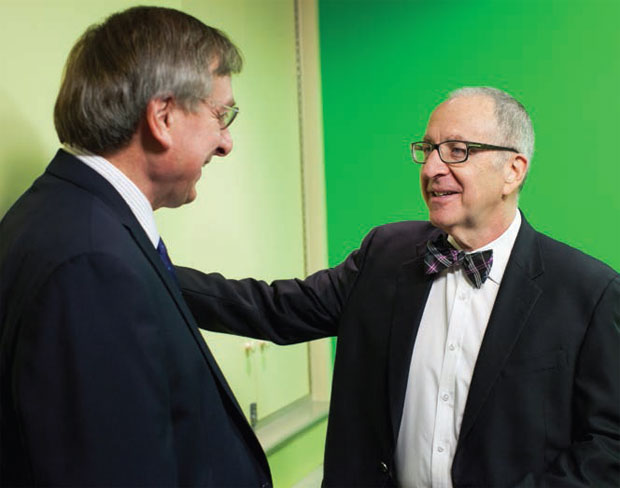
Photo: Robert Barker/UP
The position of provost is perhaps the most critical to the overall strength of our University. As the chief academic officer and chief operations officer, as well as the president’s first deputy officer, the provost oversees all of Cornell’s academic programs and units except those reporting to the provost for medical affairs. We are fortunate that our current provost, Kent Fuchs, brings to his position deep knowledge of Cornell and higher education gained from his years as a faculty member and dean of our College of Engineering. He has the qualities of leadership and vision that are essential to creating a university that is even more distinguished and financially sound—one that is capable of inspired teaching, path-breaking research, scholarship and creative work, and transformative public engagement. Kent and I recently discussed the state of our University and its future, and I’m pleased to share some of that discussion with you.
David Skorton: The overarching aspiration expressed in Cornell’s 2010 strategic plan is for us to be “widely recognized as a top-ten research university in the world, and a model university for the interweaving of liberal education and fundamental knowledge with practical education and impact on societal and world problems.” Given all that has changed since 2010, how are we doing?
Kent Fuchs: We are doing exceptionally well, but our aspiration is to do even better. For example, twenty-two of our academic departments are now ranked in the top five of their discipline, which is matched by only two other universities. Our goal is to enhance the University’s overall stature, as well as the stature of our numerous individual programs.
DS: Faculty renewal has been a key component in our efforts to increase our stature among the world’s great universities. Given this “once-in-a-generation” opportunity for Cornell to reshape our faculty, are there academic areas in need of significant improvement or that present unusual opportunities for us?
KF: The faculty renewal initiative has been exceptionally successful, thanks in part to the resources for faculty recruitment and retention we have gained through the Cornell Now campaign. We now have 1,627 faculty on the Ithaca campus, which matches our all-time record. The academic deans and chairs are recruiting faculty in areas of future strategic importance; arts and sciences, life sciences, technology and innovation, economics and business, and the social sciences are broad areas of particular focus, in addition to Weill Cornell Medical College.
DS: Looking ahead, what looming disruptive changes need to be on our radar? And how do we prepare for them?
KF: I see three disruptive changes in the immediate future: our commitment to grow Cornell’s physical presence in New York City, the use of connective technology to scale educational impact, and the business model for sustaining excellence in research and creativity. We are already seizing the opportunities provided by the first two disruptive changes, but have a ways to go before fully resolving the business model for scholarship and innovation. Input from alumni on these and other disruptive changes facing higher education is particularly welcome.
DS: How will we know that we have succeeded?
KF: We have launched an annual rigorous comparative assessment of our progress, including how we compare to our peers and how Cornell has changed over time. This assessment already is helping us understand and plan Cornell’s future, and it will also help us engage and lead in the national debate regarding student learning and the value of higher education. Again, alumni input is needed and welcome.
We value the insights that readers of Cornell Alumni Magazine can provide us as we continue to move Cornell to an even more prominent position of national and global leadership. Please feel free to contact us by e-mail at david.skorton@cornell.edu and provost@cornell.edu.


